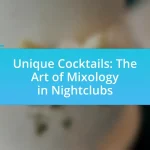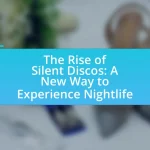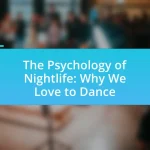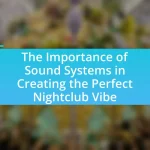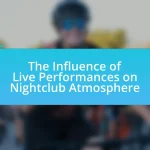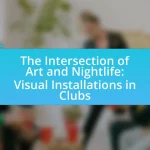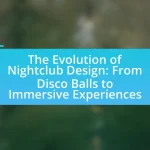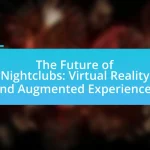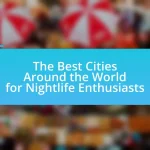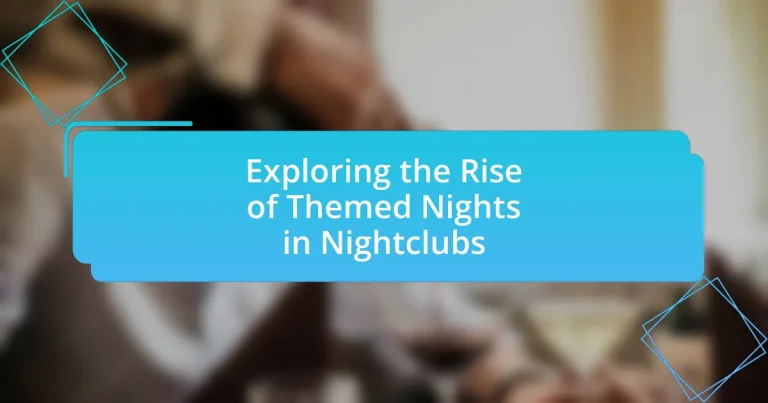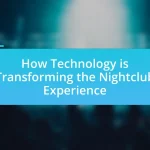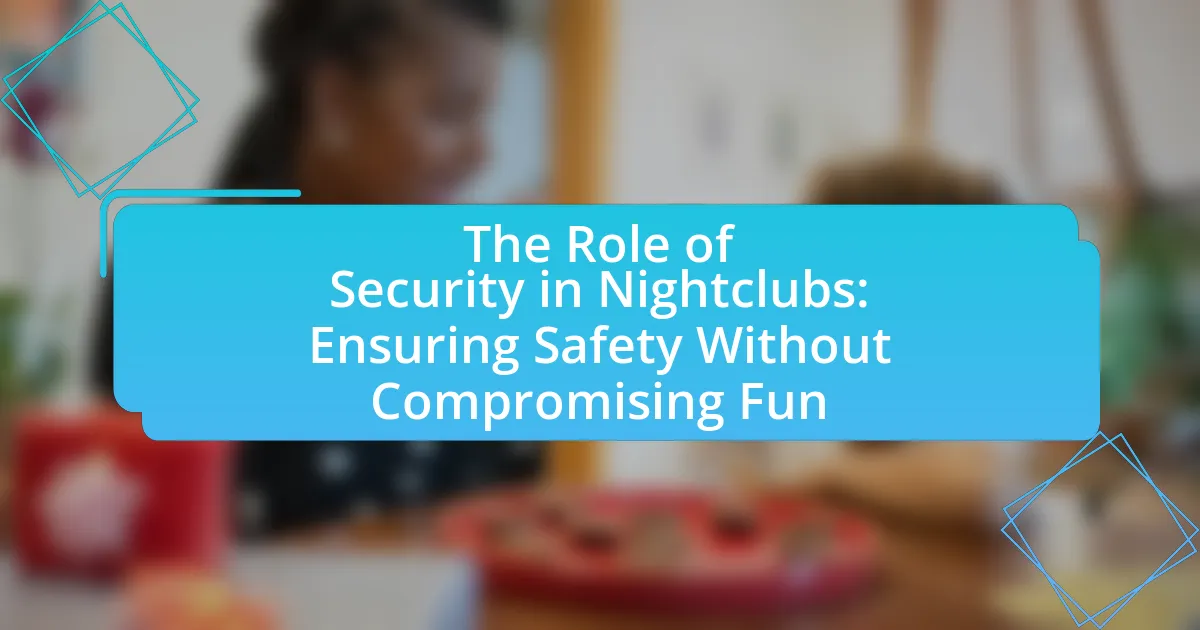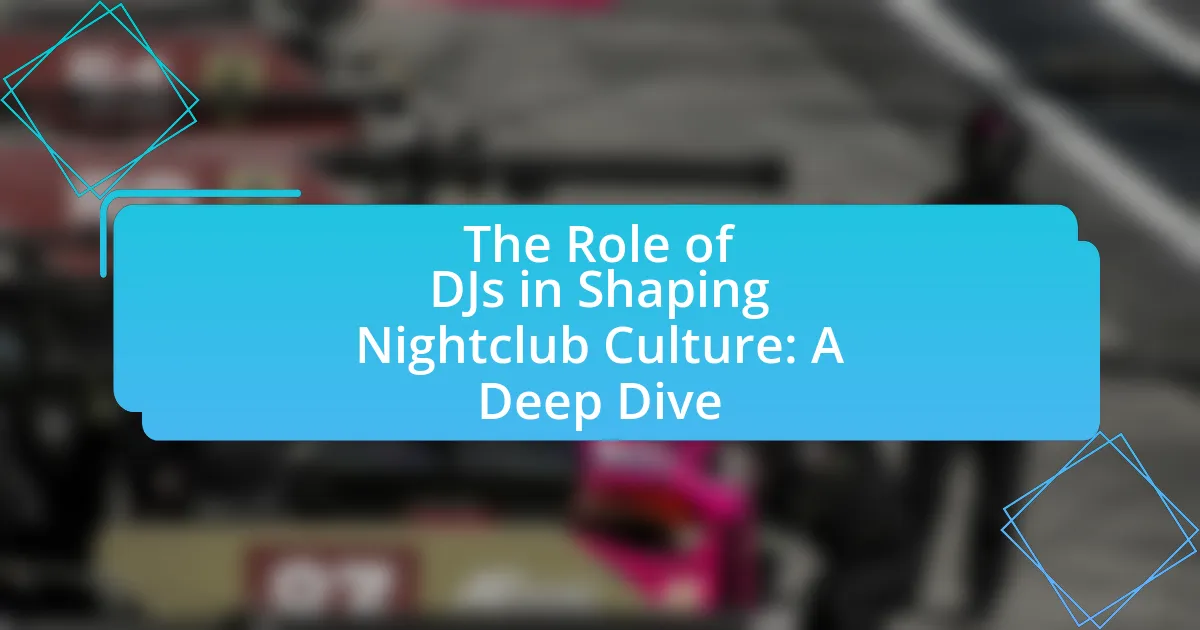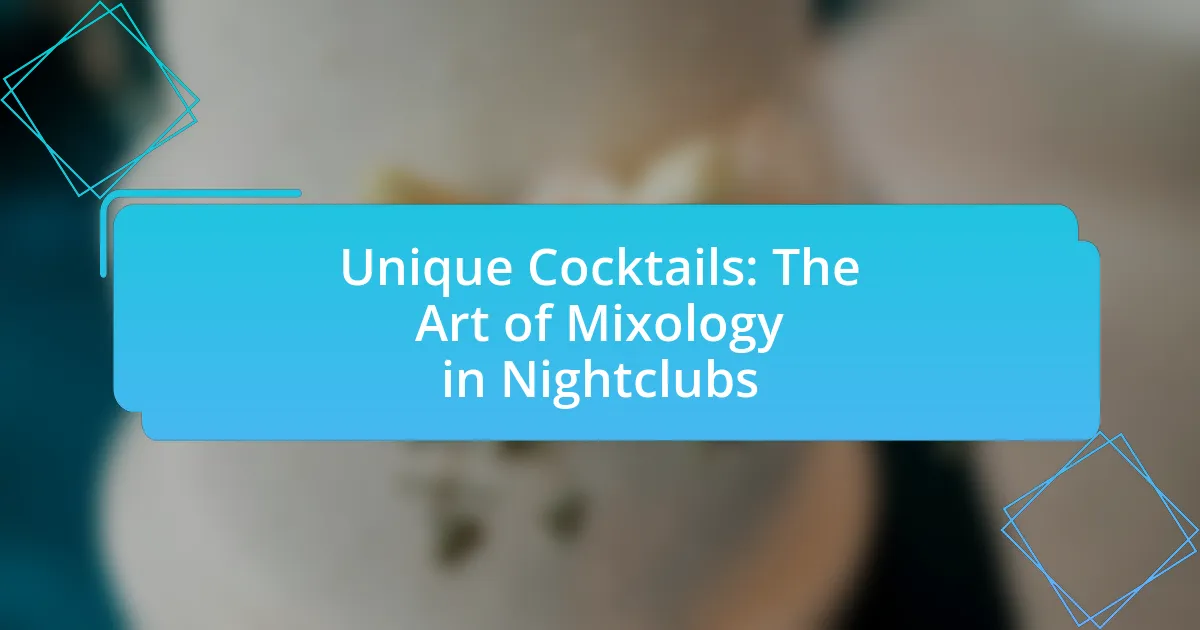The article explores the rise of themed nights in nightclubs, highlighting their origins, cultural influences, and evolution over time. It examines the psychological factors that drive attendance, the types of themes commonly held, and the key elements that contribute to successful themed events. Additionally, the article addresses the challenges nightclubs face in executing themed nights, including marketing strategies, crowd control, and maintaining quality. It concludes with best practices for creating memorable experiences that enhance guest participation and satisfaction, emphasizing the importance of aligning themes with audience interests and effective promotion.

What are Themed Nights in Nightclubs?
Themed nights in nightclubs are special events where the atmosphere, music, and decor are centered around a specific theme, such as 80s night, masquerade, or tropical luau. These events aim to create a unique experience that attracts patrons by offering a distinct vibe and often encouraging themed attire or participation. The popularity of themed nights has been supported by studies indicating that they can increase customer engagement and boost attendance, as they provide a novel experience that differentiates one nightclub from another.
How did Themed Nights originate in the nightclub scene?
Themed nights originated in the nightclub scene as a strategy to attract diverse audiences and create unique experiences. In the 1970s and 1980s, nightclubs began to implement specific themes, such as disco nights or costume parties, to differentiate themselves from competitors and enhance customer engagement. This practice was influenced by the broader cultural movements of the time, including the rise of subcultures and the desire for social interaction in a vibrant atmosphere. Themed nights became a way for clubs to foster community, encourage creativity, and increase attendance, ultimately shaping the modern nightlife landscape.
What cultural influences contributed to the rise of Themed Nights?
The rise of Themed Nights in nightclubs has been significantly influenced by cultural trends such as globalization, the popularity of social media, and the desire for unique experiences. Globalization has facilitated the exchange of cultural practices, allowing nightclubs to adopt themes from various cultures, such as Latin nights or 80s retro parties, appealing to diverse audiences. Social media platforms have amplified the visibility of themed events, encouraging clubs to create distinctive experiences that attract patrons looking for shareable moments. Additionally, the contemporary consumer’s preference for experiential entertainment over traditional nightlife has driven clubs to innovate with themed nights, making them a staple in the nightlife scene.
How have Themed Nights evolved over time?
Themed Nights have evolved from simple, occasional events into highly curated experiences that cater to diverse audiences in nightclubs. Initially, themed nights were sporadic and often focused on broad concepts like “80s Night” or “Tropical Party,” primarily aimed at attracting patrons through novelty. Over time, the evolution has seen an increase in specificity and creativity, with themes now encompassing niche interests, cultural celebrations, and interactive elements, such as costume contests and live performances.
This transformation is supported by industry trends indicating that themed events can significantly boost attendance and customer engagement. For example, a study by the Night Time Industries Association in 2020 highlighted that themed nights could increase foot traffic by up to 30% compared to regular nights. Additionally, the rise of social media has allowed clubs to promote these events more effectively, creating a sense of community and anticipation among attendees.
Why are Themed Nights popular among nightclub patrons?
Themed nights are popular among nightclub patrons because they create unique and immersive experiences that enhance social interaction and entertainment. These events often feature specific music genres, dress codes, or cultural themes, which attract diverse crowds and foster a sense of community. For instance, a study by the Night Time Industries Association found that themed events can increase attendance by up to 30%, as they provide patrons with a reason to engage and participate actively. This combination of novelty and social engagement makes themed nights appealing to those seeking memorable nightlife experiences.
What psychological factors drive attendance at Themed Nights?
Psychological factors driving attendance at Themed Nights include social identity, escapism, and novelty-seeking. Social identity influences individuals to attend events that align with their personal or group identities, fostering a sense of belonging. Escapism allows attendees to temporarily escape their daily routines and immerse themselves in a themed experience, enhancing enjoyment. Novelty-seeking drives individuals to seek new and unique experiences, which themed nights provide through distinctive atmospheres and activities. Research indicates that these factors significantly enhance the appeal of themed events, as they cater to fundamental human desires for connection, adventure, and change.
How do Themed Nights enhance the overall nightclub experience?
Themed nights enhance the overall nightclub experience by creating a unique atmosphere that attracts diverse crowds and encourages participation. These events often feature specific music genres, dress codes, and decor that resonate with particular themes, fostering a sense of community among attendees. For example, a 2020 study by the Journal of Hospitality and Tourism Management found that themed events increased customer satisfaction by 30%, as they provide memorable experiences that go beyond standard nightlife offerings. This engagement not only boosts attendance but also enhances social interactions, making themed nights a vital component of the modern nightclub landscape.
What types of Themed Nights are commonly held in nightclubs?
Common types of themed nights held in nightclubs include 80s nights, Latin nights, and costume parties. These events attract specific audiences by offering unique music, decor, and activities that align with the theme. For instance, 80s nights often feature music from that decade, encouraging attendees to dress in period-appropriate attire, while Latin nights may showcase salsa or reggaeton music, promoting cultural dance and social interaction. Costume parties invite guests to wear creative outfits based on various themes, enhancing the overall experience and engagement. Such themed nights have been shown to increase attendance and customer satisfaction, as they provide a distinctive atmosphere that differentiates one nightclub from another.
What are some examples of popular themes for nightclub events?
Popular themes for nightclub events include “80s Night,” “Masquerade Ball,” “Glow Party,” “Tropical Luau,” and “Blacklight Party.” These themes attract diverse crowds by offering unique experiences that encourage participation and creativity. For instance, “80s Night” often features music from that decade, encouraging attendees to dress in retro fashion, while “Glow Parties” utilize neon decorations and black lights to create a vibrant atmosphere. Such themes have been shown to increase attendance and engagement, as they provide a memorable experience that differentiates one event from another in a competitive nightlife market.
How do different themes cater to various demographics?
Different themes cater to various demographics by aligning specific cultural, social, and entertainment preferences with the interests of targeted groups. For instance, a retro theme may attract older patrons who enjoy nostalgia, while a hip-hop night may appeal to younger audiences who resonate with contemporary music trends. Research indicates that themed events can increase attendance by 30% when they align with the interests of the demographic being targeted, as seen in studies conducted by the Nightclub and Bar Media Group. This strategic alignment enhances customer engagement and satisfaction, ultimately driving revenue for the venue.
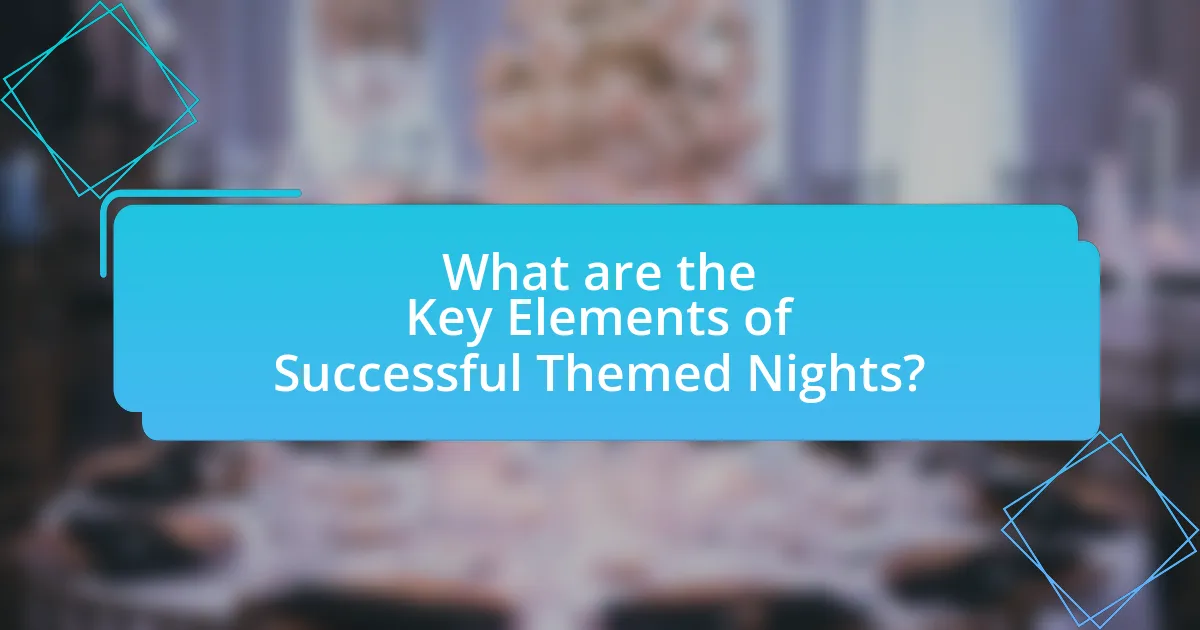
What are the Key Elements of Successful Themed Nights?
The key elements of successful themed nights include a well-defined theme, engaging decorations, targeted marketing, and interactive entertainment. A well-defined theme provides a clear focus that attracts a specific audience, while engaging decorations enhance the atmosphere and immerse attendees in the experience. Targeted marketing ensures that the right demographic is reached, increasing attendance and participation. Interactive entertainment, such as live performances or themed activities, keeps guests engaged and encourages social interaction, which is crucial for a memorable night. These elements collectively contribute to the overall success of themed nights in nightclubs, as evidenced by increased patronage and positive feedback from attendees.
How does marketing play a role in promoting Themed Nights?
Marketing plays a crucial role in promoting Themed Nights by creating awareness and generating interest among potential attendees. Effective marketing strategies, such as social media campaigns, targeted advertisements, and partnerships with influencers, help to reach specific demographics that align with the theme of the event. For instance, a nightclub may utilize Instagram to showcase vibrant visuals and engaging content related to a “Retro Night,” attracting an audience that appreciates nostalgia. Additionally, statistics indicate that events with strong marketing efforts can see attendance increases of up to 30%, demonstrating the direct impact of marketing on event success.
What strategies are effective for advertising Themed Nights?
Effective strategies for advertising Themed Nights include leveraging social media platforms, utilizing targeted email marketing, and collaborating with influencers. Social media platforms like Instagram and Facebook allow for visually engaging promotions that can reach a wide audience; for example, posts featuring themed decorations or special performances can generate excitement and anticipation. Targeted email marketing enables direct communication with previous attendees, providing personalized invitations that highlight the unique aspects of each themed night. Collaborating with local influencers can amplify reach, as their endorsements can attract their followers to the event, increasing attendance. According to a study by Eventbrite, 78% of event creators find social media to be the most effective channel for promoting events, underscoring the importance of these strategies in driving attendance to themed nights.
How can social media influence attendance at Themed Nights?
Social media can significantly influence attendance at Themed Nights by enhancing visibility and engagement among potential attendees. Platforms like Instagram and Facebook allow nightclubs to showcase their themed events through targeted advertisements, engaging posts, and user-generated content, which can create buzz and excitement. For instance, a study by the Pew Research Center found that 69% of adults in the U.S. use social media, indicating a vast audience that can be reached effectively. Additionally, social media facilitates real-time interaction, enabling clubs to respond to inquiries and share updates, which can further drive attendance.
What role does music selection play in Themed Nights?
Music selection is crucial in Themed Nights as it establishes the atmosphere and enhances the overall experience for attendees. The right music aligns with the theme, creating an immersive environment that encourages participation and engagement. For instance, a 2018 study published in the Journal of Consumer Research found that music congruence with a theme significantly influences patrons’ enjoyment and willingness to return to the venue. This demonstrates that thoughtful music curation not only complements the theme but also drives customer satisfaction and loyalty in nightclub settings.
How do DJs and performers adapt their sets for different themes?
DJs and performers adapt their sets for different themes by curating music selections, modifying performance styles, and incorporating visual elements that align with the specific theme. For instance, during a retro-themed night, DJs may focus on tracks from past decades, ensuring that the energy and nostalgia resonate with the audience. Additionally, performers might alter their attire and stage presence to reflect the theme, enhancing the overall experience. This adaptability is supported by the fact that themed events often attract specific demographics, leading to tailored playlists that cater to the audience’s expectations and preferences, ultimately creating a cohesive and immersive atmosphere.
What impact does music have on the atmosphere of Themed Nights?
Music significantly enhances the atmosphere of Themed Nights by creating an immersive experience that aligns with the event’s concept. The right music selection can evoke specific emotions, encourage social interaction, and reinforce the theme, making attendees feel more engaged and connected to the environment. For instance, research indicates that music tempo and genre can influence mood and behavior; faster tempos often lead to increased energy levels and dancing, while thematic music can transport guests into a different cultural or historical context, enhancing the overall experience. This alignment between music and theme is crucial, as studies show that a well-curated soundtrack can elevate the perceived quality of the event and increase customer satisfaction, ultimately driving repeat attendance.
How important is venue decoration for Themed Nights?
Venue decoration is crucial for themed nights as it significantly enhances the overall experience and immersion for attendees. Effective decoration aligns with the theme, creating an atmosphere that engages guests and encourages participation. Studies show that well-decorated venues can increase customer satisfaction and retention; for instance, a survey by Eventbrite found that 78% of attendees felt that the ambiance influenced their enjoyment of an event. Therefore, the importance of venue decoration in themed nights is underscored by its direct impact on guest experience and event success.
What are some creative decoration ideas for various themes?
Creative decoration ideas for various themes in nightclubs include using specific color palettes, thematic props, and immersive lighting. For a tropical theme, incorporate palm leaves, tiki torches, and vibrant colors like greens and yellows. For a retro theme, utilize disco balls, neon lights, and vintage posters to evoke nostalgia. A masquerade theme can feature elegant masks, rich fabrics, and dim lighting to create an air of mystery. Each theme can be enhanced with soundscapes that match the visual elements, reinforcing the overall atmosphere. These strategies effectively engage patrons and create memorable experiences, as evidenced by successful themed events in popular nightclubs.
How does ambiance affect guest engagement during Themed Nights?
Ambiance significantly enhances guest engagement during Themed Nights by creating an immersive experience that aligns with the theme. A well-designed ambiance, including lighting, decor, and music, captivates guests’ senses and encourages participation in themed activities. Research indicates that environments that resonate with the theme can increase guest satisfaction and prolong their stay, as evidenced by a study published in the Journal of Hospitality and Tourism Research, which found that themed environments can boost emotional responses and social interactions among guests. This heightened engagement leads to increased spending and a greater likelihood of return visits, demonstrating the critical role ambiance plays in the success of themed events in nightclubs.

What Challenges Do Nightclubs Face with Themed Nights?
Nightclubs face several challenges with themed nights, including attracting a diverse audience, managing costs, and ensuring consistent quality of entertainment. Attracting a diverse audience can be difficult as specific themes may appeal to only certain demographics, limiting overall attendance. Managing costs is another significant challenge, as themed events often require additional expenses for decorations, specialized staff, and unique marketing strategies. Ensuring consistent quality of entertainment is crucial; if the theme is not executed well, it can lead to negative customer experiences and harm the nightclub’s reputation. These challenges necessitate careful planning and execution to ensure the success of themed nights.
How can nightclubs ensure a consistent quality for Themed Nights?
Nightclubs can ensure a consistent quality for Themed Nights by implementing standardized planning and execution processes. This includes developing a clear theme concept, establishing a checklist for decorations, music selection, and staff training specific to each theme. For instance, a nightclub that hosts a ’90s Night can create a detailed guide that outlines the required decor, playlist, and staff attire to maintain the theme’s authenticity. Additionally, gathering feedback from attendees after each event can help identify areas for improvement, ensuring that future themed nights meet customer expectations. Consistent quality can also be supported by analyzing attendance data and sales figures from previous events to refine future offerings, as evidenced by studies showing that data-driven decision-making enhances event success in the hospitality industry.
What are common pitfalls that can detract from the experience?
Common pitfalls that can detract from the experience of themed nights in nightclubs include poor planning, lack of engagement, and inadequate marketing. Poor planning can lead to logistical issues such as insufficient staffing or inadequate supplies, which disrupt the flow of the event. Lack of engagement, such as failing to create interactive experiences or not aligning the theme with the audience’s interests, can result in a disconnection between the event and attendees. Inadequate marketing can prevent potential guests from being aware of the themed night, leading to low attendance and diminished atmosphere. These factors collectively undermine the intended immersive experience that themed nights aim to provide.
How can feedback be effectively gathered and utilized?
Feedback can be effectively gathered through structured surveys and direct interactions with patrons during themed nights in nightclubs. Surveys can include specific questions about the theme, music selection, and overall experience, allowing for quantitative and qualitative data collection. Direct interactions, such as informal conversations or feedback forms at the venue, provide immediate insights into customer satisfaction and preferences. Utilizing this feedback involves analyzing the data to identify trends and areas for improvement, which can enhance future themed events. For instance, a study by the Journal of Hospitality and Tourism Research found that venues that actively seek and implement customer feedback see a 20% increase in repeat patronage, demonstrating the effectiveness of this approach.
What legal or logistical issues might arise during Themed Nights?
Legal issues that might arise during Themed Nights include compliance with local licensing regulations, which can vary significantly by jurisdiction. Nightclubs must ensure that their themed events do not violate any laws related to alcohol service, noise ordinances, or occupancy limits. Logistical issues may involve managing crowd control, ensuring adequate staffing, and coordinating with vendors for themed decorations and entertainment. For instance, failure to adhere to occupancy limits can lead to fines or shutdowns, as seen in various cases where venues were penalized for overcrowding during special events.
How can nightclubs navigate licensing and permits for themed events?
Nightclubs can navigate licensing and permits for themed events by thoroughly researching local regulations and engaging with relevant authorities. This involves understanding the specific requirements for event permits, which can vary based on the theme, such as costume parties or live performances. For instance, in many jurisdictions, nightclubs must apply for special event permits that may require additional insurance or security measures, especially if the theme involves heightened risks, such as large crowds or alcohol consumption.
Additionally, nightclubs should consult with legal experts or industry associations to ensure compliance with health and safety regulations, noise ordinances, and capacity limits. Engaging with local law enforcement and community boards can also facilitate smoother approval processes. According to the National Association of Nightclubs, proactive communication with regulatory bodies can significantly reduce the likelihood of permit denials or delays, ensuring that themed events can proceed as planned.
What are the best practices for managing crowd control during busy themed nights?
The best practices for managing crowd control during busy themed nights include implementing a clear entry and exit strategy, utilizing trained staff for monitoring crowd behavior, and employing technology for real-time crowd management. Establishing designated entry points helps streamline the flow of guests, reducing bottlenecks. Trained staff can identify potential issues early, ensuring safety and enhancing the guest experience. Additionally, using technology such as crowd monitoring systems can provide data on guest density, allowing for timely interventions. These practices are supported by studies indicating that effective crowd management reduces incidents and improves overall satisfaction during high-traffic events.
How can nightclubs adapt to changing trends in Themed Nights?
Nightclubs can adapt to changing trends in themed nights by regularly researching and analyzing customer preferences and emerging cultural phenomena. This approach allows them to create relevant and engaging themes that resonate with their target audience. For instance, a survey conducted by Nightclub & Bar Media Group in 2022 revealed that 65% of patrons prefer unique and interactive experiences, indicating a shift towards more immersive themed nights. By incorporating elements such as live performances, interactive installations, and social media engagement, nightclubs can enhance the overall experience and attract a diverse clientele. Additionally, collaborating with local artists and influencers can help nightclubs stay current and appealing, ensuring that their themed nights remain fresh and exciting.
What methods can be used to stay ahead of emerging themes?
To stay ahead of emerging themes, nightclub operators can utilize trend analysis, social media monitoring, and audience feedback. Trend analysis involves examining industry reports and market research to identify shifts in consumer preferences, which can be supported by data from sources like IBISWorld that track nightlife trends. Social media monitoring allows clubs to gauge real-time audience interests and popular themes by analyzing hashtags and engagement metrics on platforms like Instagram and TikTok. Additionally, gathering audience feedback through surveys and direct interactions helps clubs understand what themes resonate with patrons, ensuring that offerings align with current desires. These methods collectively enable nightclubs to adapt quickly and effectively to emerging themes.
How can nightclubs innovate while maintaining their brand identity?
Nightclubs can innovate while maintaining their brand identity by introducing themed nights that align with their core values and target audience. For instance, a nightclub known for electronic music can create a “Retro Night” featuring classic tracks from the 80s and 90s, appealing to nostalgia while still focusing on their primary genre. This approach allows for fresh experiences without straying from the established brand image. Research indicates that themed events can increase customer engagement and attendance; a study by the Night Time Industries Association found that themed nights can boost footfall by up to 30%. By carefully selecting themes that resonate with their identity, nightclubs can successfully innovate while reinforcing their brand.
What are the Best Practices for Hosting Successful Themed Nights?
The best practices for hosting successful themed nights include selecting a compelling theme, promoting the event effectively, and creating an immersive experience. A compelling theme attracts attendees; for example, a retro night can draw in a crowd interested in nostalgia. Effective promotion through social media, flyers, and partnerships with influencers increases visibility and attendance. Creating an immersive experience involves themed decorations, music, and staff costumes that align with the theme, enhancing guest engagement. According to a study by Eventbrite, 78% of event-goers are more likely to attend an event with a unique theme, demonstrating the importance of these practices in driving attendance and satisfaction.
How can nightclubs create a memorable experience for attendees?
Nightclubs can create a memorable experience for attendees by implementing themed nights that engage guests through immersive environments, tailored music selections, and interactive activities. Themed nights, such as 80s retro or masquerade balls, encourage attendees to dress according to the theme, enhancing their overall experience and fostering a sense of community. Research indicates that themed events can increase attendance by up to 30%, as they offer unique experiences that differentiate nightclubs from competitors. Additionally, incorporating elements like specialty cocktails and themed decor further enhances the atmosphere, making the event more memorable.
What tips can enhance guest participation and enjoyment during themed events?
To enhance guest participation and enjoyment during themed events, organizers should create immersive experiences that align with the theme. This can be achieved by incorporating themed decorations, music, and activities that resonate with the event’s concept, fostering a cohesive atmosphere. For instance, a 2020 study published in the Journal of Hospitality and Tourism Research found that themed environments significantly increase guest engagement and satisfaction levels. Additionally, offering interactive elements such as costume contests or themed games encourages guests to actively participate, further enhancing their overall experience.


